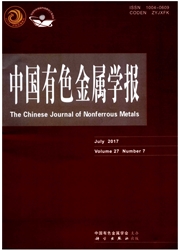

 中文摘要:
中文摘要:
采用光学金相、示差扫描量热分析、扫描电镜、室温拉伸及断裂韧性实验,研究多级固溶处理对7050铝合金强度和断裂韧性的影响。结果表明:7050铝合金厚板经多级强化固溶后,随最后一级温度的增加,可溶性粗大第二相减少,其强度和断裂韧性增加,当最后一级温度为493℃时,合金的断裂韧性和强度达到峰值,其断裂韧性(KIC)、屈服强度(σ0.2)和抗拉强度(σb)分别为37.4 MPa.m1/2、500.6 MPa和534.0 MPa;当最后一级温度超过493℃时,由于再结晶分数急剧增加、晶粒快速长大,断裂韧性和强度又逐渐降低;当多级固溶最后一级的温度和时间与单级固溶一致时,经多级强化固溶后的7050铝合金具有比单级固溶时更高的断裂韧性和强度。
 英文摘要:
英文摘要:
The effects of the multi-stage promotively-solufionizing treatment on the tensile property and fracture toughness of the 7050 aluminum alloy plate were investigated by optical microscopy (OM), differential scanning calorimetry (DSC), scanning electron microscopy (SEM), tensile test and toughness test. The results show that the tensile property and fracture toughness of the multi-stage promotively-solutionizing treated samples increase when the last stage temperature increases. When the last stage temperature is 493 ℃, the tensile property and fracture toughness of the multi-stage promotively-solutionizing treated samples reach the peak, the fracture toughness (Klc), yield strength (σ0.2) and ultimate tensile strength (σb) are 37.4 MPa.m^1/2, 500.6 MPa and 534.0 MPa respectively. Then, the tensile property and fracture toughness of the multi-stage promotively-solutionizing treated samples decrease with the increases of the last stage temperature, because the grains grow very fast. The tensile property and fracture toughness of the multi-stage promotively-solutionizing treated samples are better than that of the single-stage solution treated samples.
 同期刊论文项目
同期刊论文项目
 同项目期刊论文
同项目期刊论文
 期刊信息
期刊信息
